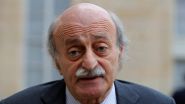Hashem Safieddine, a leading Hezbollah figure with close ties to Iran, is considered the likely successor to his cousin Hassan Nasrallah, who was killed on Friday in an Israeli airstrike on the southern suburbs of Beirut.
The Shura Council, Hezbollah’s highest body, is expected to elect Nasrallah’s successor in the upcoming days.
Hashem Safieddine is “the most likely candidate” to win this election, a source close to Hezbollah told AFP, as uncertainty continues regarding the party's future.
Meanwhile, Naim Qassem, the current deputy secretary-general of the pro-Iranian group, is expected to take over the leadership.
A distant relative of 64-year-old Hassan Nasrallah and bearing a striking resemblance to him, Hashem Safieddine is a few years younger.
He studied religion in Iran, and his son is married to Zeinab, the daughter of the powerful Iranian general Qassem Soleimani, who was killed in a US strike in Iraq in 2020.
Soleimani was the commander of the Quds Force, a wing of the Islamic Revolutionary Guard Corps overseeing external operations.
Safieddine is a senior figure in the Shura Council. Like Nasrallah, he dons the black turban of the Sayyeds, descendants of the Prophet Muhammad, to whom he traces his lineage.
He was labeled a “terrorist” by the US State Department in May 2017 and by Saudi Arabia.
“Rumors have been circulating for several years that Hashem Safieddine is the most likely candidate to succeed Hassan Nasrallah,” says Amal Saad, a Hezbollah expert and lecturer at Cardiff University.
'A Great Deal of Authority'
The researcher notes that to lead the movement, one must “be a member of the Shura Council,” which is made up of seven members, and “be a religious figure.”
As such, Safieddine has “a great deal of authority, which makes him the strongest candidate,” she asserts.
Unlike Hassan Nasrallah, who has rarely appeared in public since the last war between Israel and Hezbollah in 2006, Safieddine represents the party at many political and religious events. He recently attracted attention for his passionate speeches at the funerals of party commanders killed by Israel.
“In our resistance, (...) when a commander becomes a martyr, another takes up the banner (...) with strength and determination,” he stated during the funeral of Commander Mohammed Neemeh Nasser, who was killed in an Israeli strike in southern Lebanon.
Hassan Nasrallah succeeded Abbas Moussaoui in 1992, after Moussaoui was also assassinated by Israel.
The Shura Council, Hezbollah’s highest body, is expected to elect Nasrallah’s successor in the upcoming days.
Hashem Safieddine is “the most likely candidate” to win this election, a source close to Hezbollah told AFP, as uncertainty continues regarding the party's future.
Meanwhile, Naim Qassem, the current deputy secretary-general of the pro-Iranian group, is expected to take over the leadership.
A distant relative of 64-year-old Hassan Nasrallah and bearing a striking resemblance to him, Hashem Safieddine is a few years younger.
He studied religion in Iran, and his son is married to Zeinab, the daughter of the powerful Iranian general Qassem Soleimani, who was killed in a US strike in Iraq in 2020.
Soleimani was the commander of the Quds Force, a wing of the Islamic Revolutionary Guard Corps overseeing external operations.
Safieddine is a senior figure in the Shura Council. Like Nasrallah, he dons the black turban of the Sayyeds, descendants of the Prophet Muhammad, to whom he traces his lineage.
He was labeled a “terrorist” by the US State Department in May 2017 and by Saudi Arabia.
“Rumors have been circulating for several years that Hashem Safieddine is the most likely candidate to succeed Hassan Nasrallah,” says Amal Saad, a Hezbollah expert and lecturer at Cardiff University.
'A Great Deal of Authority'
The researcher notes that to lead the movement, one must “be a member of the Shura Council,” which is made up of seven members, and “be a religious figure.”
As such, Safieddine has “a great deal of authority, which makes him the strongest candidate,” she asserts.
Unlike Hassan Nasrallah, who has rarely appeared in public since the last war between Israel and Hezbollah in 2006, Safieddine represents the party at many political and religious events. He recently attracted attention for his passionate speeches at the funerals of party commanders killed by Israel.
“In our resistance, (...) when a commander becomes a martyr, another takes up the banner (...) with strength and determination,” he stated during the funeral of Commander Mohammed Neemeh Nasser, who was killed in an Israeli strike in southern Lebanon.
Hassan Nasrallah succeeded Abbas Moussaoui in 1992, after Moussaoui was also assassinated by Israel.
Read more



Comments